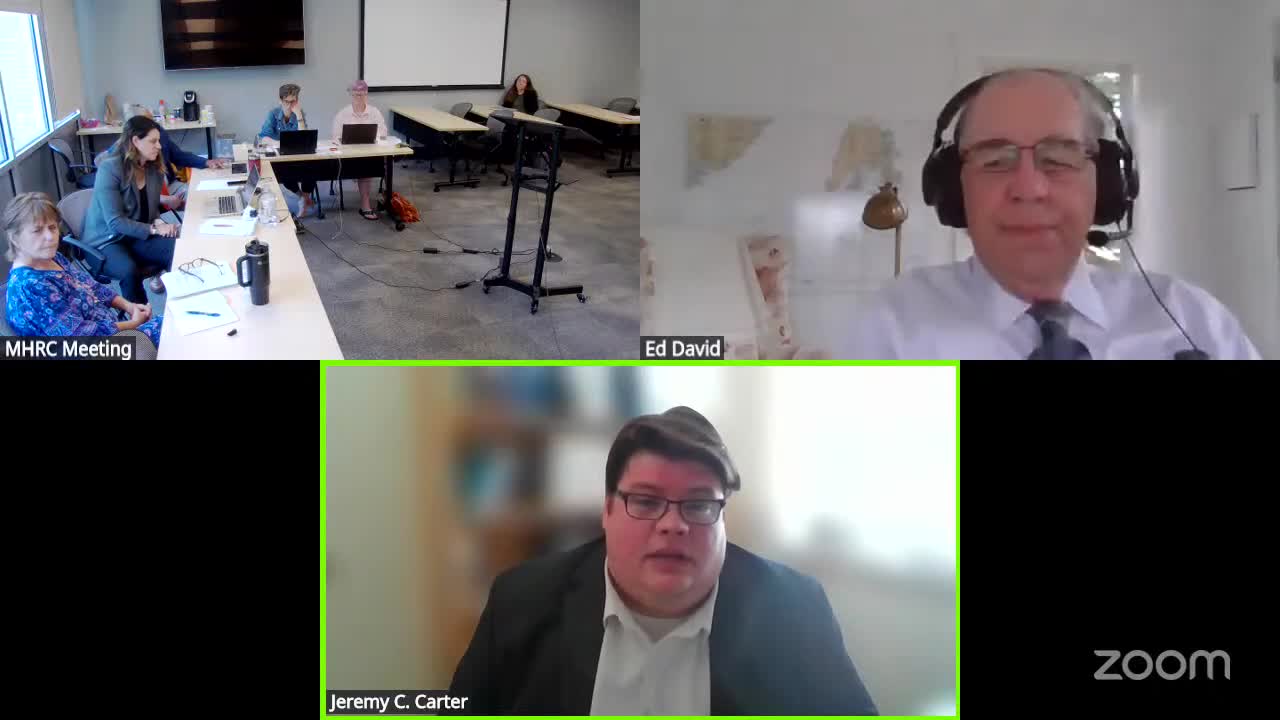Commission Considers Investigator Leyba's Recommendation on Housing Dispute Involving OBH
July 30, 2025 | Human Rights Commission, Maine, Executive, Maine
This article was created by AI summarizing key points discussed. AI makes mistakes, so for full details and context, please refer to the video of the full meeting. Please report any errors so we can fix them. Report an error »

In a recent meeting of the Maine Human Rights Commission, held on July 30, 2025, critical discussions unfolded surrounding housing rights and the responsibilities of service providers. The atmosphere was charged with the weight of the issues at hand, as attorneys presented their arguments regarding a case involving a resident's housing situation.
Attorney Carter opened the session by addressing the commission, emphasizing the importance of the findings from investigator Leyba, which recommended a conclusion of "no reasonable grounds" in the case. Carter highlighted the ongoing challenges faced by the resident, Mr. McGonagall, and the need for a thorough examination of the circumstances surrounding his housing and services.
Attorney Mott countered, asserting that the respondents had not properly objected to the commission's findings, which she argued undermined their position. She pointed out that the overseer of the housing, the Office of Behavioral Health (OBH), should have conducted a direct threat analysis regarding Mr. McGonagall's situation. Mott referenced a precedent from the Shaw v. Genesis case, arguing that the request for information made by the resident was indeed a reasonable accommodation.
The discussion turned to the responsibilities of housing providers under fair housing law. Mott contended that the alternative housing arrangement offered to Mr. McGonagall did not meet the necessary standards, citing differences in cost, location, and clinical support. She firmly stated that the burden of providing reasonable accommodations lay with the housing provider, not the resident.
As the meeting progressed, Commissioner Douglas interjected, questioning the effectiveness of the argument regarding direct threats, noting that it was undisputed that Mr. McGonagall had made a direct threat. This point underscored the complexity of balancing safety concerns with the rights of individuals seeking housing.
In closing, the investigator assigned to the case reiterated that the presentations made during the meeting did not alter the initial recommendation. The commission's deliberations highlighted the ongoing struggle for fair housing rights and the critical role of thorough assessments in ensuring that individuals receive the support they need.
As the meeting wrapped up, the implications of the discussions resonated beyond the room, reflecting broader societal issues surrounding housing rights and the responsibilities of service providers in Maine. The commission's decision will undoubtedly shape future interactions between residents and housing authorities, emphasizing the need for careful consideration of individual circumstances in the pursuit of justice and equity.
Attorney Carter opened the session by addressing the commission, emphasizing the importance of the findings from investigator Leyba, which recommended a conclusion of "no reasonable grounds" in the case. Carter highlighted the ongoing challenges faced by the resident, Mr. McGonagall, and the need for a thorough examination of the circumstances surrounding his housing and services.
Attorney Mott countered, asserting that the respondents had not properly objected to the commission's findings, which she argued undermined their position. She pointed out that the overseer of the housing, the Office of Behavioral Health (OBH), should have conducted a direct threat analysis regarding Mr. McGonagall's situation. Mott referenced a precedent from the Shaw v. Genesis case, arguing that the request for information made by the resident was indeed a reasonable accommodation.
The discussion turned to the responsibilities of housing providers under fair housing law. Mott contended that the alternative housing arrangement offered to Mr. McGonagall did not meet the necessary standards, citing differences in cost, location, and clinical support. She firmly stated that the burden of providing reasonable accommodations lay with the housing provider, not the resident.
As the meeting progressed, Commissioner Douglas interjected, questioning the effectiveness of the argument regarding direct threats, noting that it was undisputed that Mr. McGonagall had made a direct threat. This point underscored the complexity of balancing safety concerns with the rights of individuals seeking housing.
In closing, the investigator assigned to the case reiterated that the presentations made during the meeting did not alter the initial recommendation. The commission's deliberations highlighted the ongoing struggle for fair housing rights and the critical role of thorough assessments in ensuring that individuals receive the support they need.
As the meeting wrapped up, the implications of the discussions resonated beyond the room, reflecting broader societal issues surrounding housing rights and the responsibilities of service providers in Maine. The commission's decision will undoubtedly shape future interactions between residents and housing authorities, emphasizing the need for careful consideration of individual circumstances in the pursuit of justice and equity.
View full meeting
This article is based on a recent meeting—watch the full video and explore the complete transcript for deeper insights into the discussion.
View full meeting
